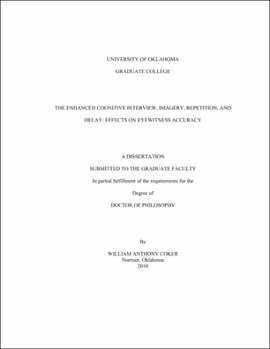| dc.description.abstract | In two experiments we examined the usefulness of the enhanced cognitive interview (ECI; Fisher & Geiselman, 1992) as both a research tool and interview protocol for use with victims and witnesses to crimes. The ECI was developed based on a variety cognitive theories and conversational techniques that have facilitated memory performance in laboratory experiments. Previous research has attempted to validate the ECI as an optimal interview technique, but there are limitations to those attempts (e.g., M. R. Davis, McMahon, & Greenwood, 2005; Milne & Bull, 2002). The present research offers a novel methodology to address these previous limitations. Experiment 1 examined the usefulness of the focused imagery component of the ECI and the effects of delay and repetition of interviewing on eyewitness accuracy. The results showed that the inclusion of focused imagery as part of the ECI significantly improved eyewitness recall accuracy, particularly for person details, and this advantage increased when the initial interview was delayed for a week compared to immediately after the witnessed event. The results also showed no change in eyewitness accuracy between an initial interview conducted immediately after the witnessed event and a repetition of the interview a week later. Experiment 2 examined the impact of the ECI on eyewitness identification accuracy, as little research has been done in this area. Previous research suggests that when eyewitnesses generate a sufficient amount of suspect detail, they are less likely to identify a suspect in a subsequent lineup. The results of Experiment 2 showed that compared to a control interview, there were no significant differences in selection rates with the ECI. Experiment 2 also failed to find the same benefits in recall accuracy that were found in Experiment 1. Implications and future directions are discussed. | |
